| | Mathison Museum of Natural History |  |
|
+17Birdsage Bonnie Saarlooswolfhound widukind Joliezac spacelab Pardofelis landrover Megaptera lucky luke rogerpgvg Jill George pipsxlch Duck-Anch-Amun Kikimalou Roger 21 posters |
|
| Author | Message |
|---|
widukind
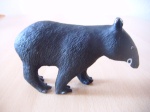
Country/State : Germany
Age : 48
Joined : 2010-12-30
Posts : 45745
 |  Subject: Re: Mathison Museum of Natural History Subject: Re: Mathison Museum of Natural History  Sat Jul 03, 2021 3:03 pm Sat Jul 03, 2021 3:03 pm | |
| |
|
  | |
bmathison1972
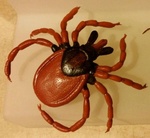
Country/State : Salt Lake City, UT
Age : 52
Joined : 2010-04-13
Posts : 6710
 |  Subject: Re: Mathison Museum of Natural History Subject: Re: Mathison Museum of Natural History  Sun Jul 04, 2021 12:59 pm Sun Jul 04, 2021 12:59 pm | |
| Species: Heterixalus rutenbergi (Boettger, 1881) (Rutenberg's reed frog) About the Figure: Manufacturer: Colorata Series: Tropical Rain Forest Frogs Year of Release: 2019 (2005) Size/Scale: Base 9.0 cm long. Body length 3.3 cm for a scale of 1.3:1 Frequency of species in toy/figure form (at time of posting): Unique Miscellaneous Notes: My figure is from the 2019 release of the collection; the original figure is from 2005. The frog is not removable from its leaf base. About the Animal: Geographic distribution: Central and eastern Madagascar Habitat: Tropical grassland, freshwater marshes, agricultural land Diet: Insects and other arthropods IUCN Status (at time of posting): Least Concern Miscellaneous Notes: Although classified as 'Least Concern' by the IUCN, H. rutenbergi is threatened by habitat loss. It is an adaptable species, however, and can colonize well-irrigated agricultural lands, including arable land. [You must be registered and logged in to see this image.] |
|
  | |
rogerpgvg
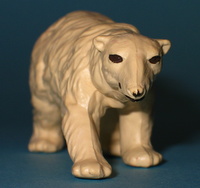
Country/State : UK
Age : 54
Joined : 2016-04-29
Posts : 3894
 |  Subject: Re: Mathison Museum of Natural History Subject: Re: Mathison Museum of Natural History  Sun Jul 04, 2021 1:40 pm Sun Jul 04, 2021 1:40 pm | |
| Beautiful frog and photo! |
|
  | |
widukind

Country/State : Germany
Age : 48
Joined : 2010-12-30
Posts : 45745
 | |
  | |
bmathison1972

Country/State : Salt Lake City, UT
Age : 52
Joined : 2010-04-13
Posts : 6710
 |  Subject: Re: Mathison Museum of Natural History Subject: Re: Mathison Museum of Natural History  Mon Jul 05, 2021 12:53 pm Mon Jul 05, 2021 12:53 pm | |
| Species: Dunckerocampus dactyliophorus (Bleeker, 1853) (banded pipefish; ringed pipefish) About the Figure: Manufacturer: Cadbury Series: Yowies Series 3 Year of Release: 1999 Size/Scale: Body length 11.0 cm for a scale of 1:1.7 Frequency of species in toy/figure form (at time of posting): Unique Miscellaneous Notes: Being one of the original Yowies figures from Australia, some assembly is required. About the Animal: Geographic distribution: Indo-Pacific Habitat: Coral reefs, tide pools, and lagoons at depths of 5-56 meters Diet: Marine invertebrates IUCN Status (at time of posting): Data Deficient Miscellaneous Notes: Like with other seahorses, it is the male of D. dactyliophorus that is equipped with a brood pouch and cares for the developing eggs. [You must be registered and logged in to see this image.] |
|
  | |
Roger
Admin
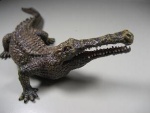
Country/State : Portugal
Age : 50
Joined : 2010-08-20
Posts : 35835
 |  Subject: Re: Mathison Museum of Natural History Subject: Re: Mathison Museum of Natural History  Mon Jul 05, 2021 2:28 pm Mon Jul 05, 2021 2:28 pm | |
| I am not too much into fishes but Syngnathiformes are surely my favorite.
It is not a surprise once the sea horse is one of the symbols of my homeland and it was a common sight for me.
Pipefish are really rare in toy shape, Yowies, as one of the kings of diversity fortunately provided this interesting species that you presented perfectly as usual. |
|
  | |
Pardofelis

Country/State : Spain
Age : 40
Joined : 2019-01-12
Posts : 2144
 |  Subject: Re: Mathison Museum of Natural History Subject: Re: Mathison Museum of Natural History  Mon Jul 05, 2021 5:39 pm Mon Jul 05, 2021 5:39 pm | |
| Nice Doryrhamphus, one of the most colorful species of Gasterosteiformes. I'm surprised that the figure is more realistic than most Australian Yowies. _________________ My collection:- (Details):
Homemade: 106
CollectA: 54
Colorata: 31
Safari LTD: 29
Schleich: 20
Papo: 16
Kaiyodo: 13
Mojo Fun: 8
Ikimon/Kitan Club: 6
Southland Replicas: 6
Bullyland: 4
PNSO: 3
CBIOV: 2
Eikoh: 2
Yujin: 2
Takara Tomy:1
Nayab: 1
Happy Kin: 1
Natural History: 1
Science & Nature: 1
Total: 307 |
|
  | |
widukind

Country/State : Germany
Age : 48
Joined : 2010-12-30
Posts : 45745
 |  Subject: Re: Mathison Museum of Natural History Subject: Re: Mathison Museum of Natural History  Mon Jul 05, 2021 6:24 pm Mon Jul 05, 2021 6:24 pm | |
| A interesting fish but Yowies are very toyish. But this figure looks more realsitic, or isnt it? |
|
  | |
bmathison1972

Country/State : Salt Lake City, UT
Age : 52
Joined : 2010-04-13
Posts : 6710
 |  Subject: Re: Mathison Museum of Natural History Subject: Re: Mathison Museum of Natural History  Tue Jul 06, 2021 12:54 pm Tue Jul 06, 2021 12:54 pm | |
| Species: Beckius beccarii (Gestro, 1876) About the Figure: Manufacturer: DeAgostini Series: World Insect Data Book Year of Release: unknown Size/Scale: Body length (excluding horns) 5.0 cm, within scale 1:1 Frequency of species in toy/figure form (at time of posting): Very rare Miscellaneous Notes: The DeAgostini figures are cast from actual specimens and are therefore all in the 1:1 range. The figures were sold as premiums with books and come in a plastic display box with their Latin and Japanese names. I am not sure what year the figures were released, and it is possible they were released over multiple years. The original set from Japan consisted of 60 species (59 male Scarabaeoidea and one dragonfly), plus four 'secret' figures representing females of select scarab males. When the set was released in Italy, three of the standard set were replaced with other species, including a leaf insect. Between the two releases and secrets, I think there are 67 figures total representing 63 species. The figures are secured to the base of the box with a small screw, but can be safely removed if one choses to display them outside of the box. The only other figure of B. beccarii I am familiar with is by Sega. About the Animal: Geographic distribution: New Guinea Habitat: Rainforests Diet: Presumably, larvae feed in decaying wood or similar substrate; adults attracted to sap flows and overripe fruit IUCN Status (at time of posting): Not Evaluated Miscellaneous Notes: I had a very hard time researching anything on the biology of this genus or species; the comments above are based on other members of the tribe Dynastini. [You must be registered and logged in to see this image.] |
|
  | |
widukind

Country/State : Germany
Age : 48
Joined : 2010-12-30
Posts : 45745
 |  Subject: Re: Mathison Museum of Natural History Subject: Re: Mathison Museum of Natural History  Tue Jul 06, 2021 5:32 pm Tue Jul 06, 2021 5:32 pm | |
| |
|
  | |
George
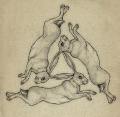
Country/State : England
Age : 41
Joined : 2021-04-05
Posts : 1599
 |  Subject: Re: Mathison Museum of Natural History Subject: Re: Mathison Museum of Natural History  Tue Jul 06, 2021 6:58 pm Tue Jul 06, 2021 6:58 pm | |
| I was always uncomfortable with that childrens' magazine series which had real specimens in resin, ('You like insects? Here, we killed thousands for you!'   ) but giving cast models of each species instead is such an improvement. Lifelike and accurate and educational, without the huge waste of life involved in production [You must be registered and logged in to see this image.] |
|
  | |
bmathison1972

Country/State : Salt Lake City, UT
Age : 52
Joined : 2010-04-13
Posts : 6710
 |  Subject: Re: Mathison Museum of Natural History Subject: Re: Mathison Museum of Natural History  Wed Jul 07, 2021 12:47 pm Wed Jul 07, 2021 12:47 pm | |
| Species: Parnassius eversmanni Ménétries, 1849 (Eversmann's parnassian) About the Figure: Manufacturer: Kaiyodo Series: Natural Monuments of Japan Year of Release: 2002 Size/Scale: Wingspan 6.0 cm, slightly over 1:1 scale for a large specimen Frequency of species in toy/figure form (at time of posting): Unique Miscellaneous Notes: The figure is removable from its habitat-style base, to which it attached with a clear acrylic rod. About the Animal: Geographic distribution: Russia, Mongolia, Japan, Alaska, and Canada (Yukon) Habitat: Alpine shrubland and woodlands, alpine meadows, tundra, riparian areas; often at high elevations Diet: Larvae feed on plants in the genus Corydalis; adults take nectar from flowers IUCN Status (at time of posting): Least Concern (globally); in North America, has a NatureServe status of Secure. Miscellaneous Notes: Parnassius eversmanni is extremely variable throughout its range, resulting in the description of several subspecies and making field identification difficult. Since this figure was part of a set focusing on the fauna of Japan, it probably represents the subspecies P. e. daisetsuzanus. [You must be registered and logged in to see this image.] |
|
  | |
Caracal
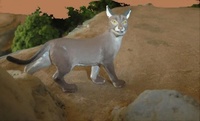
Country/State : France
Age : 65
Joined : 2018-10-24
Posts : 7252
 | |
  | |
widukind

Country/State : Germany
Age : 48
Joined : 2010-12-30
Posts : 45745
 |  Subject: Re: Mathison Museum of Natural History Subject: Re: Mathison Museum of Natural History  Thu Jul 08, 2021 8:22 am Thu Jul 08, 2021 8:22 am | |
| |
|
  | |
bmathison1972

Country/State : Salt Lake City, UT
Age : 52
Joined : 2010-04-13
Posts : 6710
 |  Subject: Re: Mathison Museum of Natural History Subject: Re: Mathison Museum of Natural History  Thu Jul 08, 2021 12:48 pm Thu Jul 08, 2021 12:48 pm | |
| Species: Melophagus ovinus (Linnaeus, 1758) (sheep ked) About the Figure: Manufacturer: unknown Series: unknown Year of Release: unknown Size/Scale: Body length 7.5 cm for a scale of 18.75:1-10.7:1 Frequency of species in toy/figure form (at time of posting): Very rare Miscellaneous Notes: I know nothing about this figure; I bought it in a dollar store in the early 2000s. It is of vintage style and I wouldn't be surprised if the sculpt is from the 1970s or earlier. Nowadays they show up primarily in cheap dollar store sets. I stopped collecting cheap 'chinabugs' but as a professional parasitologist, I could never pass on an ectoparasite, even if it's not a human parasite. I have seen one other figure of this species, much smaller and also vintage, and probably based on the Creepy Crawly Thingmaker toy set. About the Animal: Geographic distribution: Native to Europe, North Africa, Central Asia; introduced to much of the rest of the world wherever sheep are raised Habitat: Obligate ectoparasite on sheep ( Ovis aries), but also wild ungulates, rabbits, and wild and domestic canids Diet: Larvae feed on secretions provided by the female parent; adults feed on the blood of its host. IUCN Status (at time of posting): Not Evaluated Miscellaneous Notes: A female M. ovinus produces one larva at a time and may produce upwards of 20 larvae in her lifetime. The larva remains within the mother until it is ready to pupate, feeding on secretions produced in the uterus. The mature larva forms a puparium which is deposited by the mother on the wool of the sheep, attaching it with a glue-like substance. The pupa hatches after 2-3 weeks, slightly longer in the winter. The sheep ked spends its entire life on the host and is transmitted from host to host via physical contact between the hosts. [You must be registered and logged in to see this image.] |
|
  | |
Roger
Admin

Country/State : Portugal
Age : 50
Joined : 2010-08-20
Posts : 35835
 |  Subject: Re: Mathison Museum of Natural History Subject: Re: Mathison Museum of Natural History  Thu Jul 08, 2021 1:10 pm Thu Jul 08, 2021 1:10 pm | |
| Oh, I thought it was a tick but as you haven't mentioned the wrong number of legs, I decided to check and it is a fly!  Thus, the number of legs is obviously correct. It is quite surprising a Chinabug maker decided to release such a creature, even for a creepy crawler set it is not expectable at all. Sometimes I love my ignorance, if I was not aware of it, I'd keep convinced it was a tick with the wrong number of legs instead of learning that some flies can assume really unusual shapes. |
|
  | |
widukind

Country/State : Germany
Age : 48
Joined : 2010-12-30
Posts : 45745
 |  Subject: Re: Mathison Museum of Natural History Subject: Re: Mathison Museum of Natural History  Thu Jul 08, 2021 6:26 pm Thu Jul 08, 2021 6:26 pm | |
| A china figure in the kind that i like |
|
  | |
bmathison1972

Country/State : Salt Lake City, UT
Age : 52
Joined : 2010-04-13
Posts : 6710
 |  Subject: Re: Mathison Museum of Natural History Subject: Re: Mathison Museum of Natural History  Fri Jul 09, 2021 12:50 pm Fri Jul 09, 2021 12:50 pm | |
| Species: Chalcosoma chiron (Olivier, 1789) (Caucasus beetle) About the Figure: Manufacturer: Sega Series: Mushi King, standard series, small Year of Release: unknown Size/Scale: Body length (including cephalic horn) 6.0 cm, for a scale of 1:1.5-1:2 Frequency of species in toy/figure form (at time of posting): Common Miscellaneous Notes: Chalcosoma chiron is another 'standard' among the Japanese manufacturers. Most are sold under the synonym, C. caucasus. The Sega 'small standard series' were 10 sets of 10 figures each, for a total of 100 figures representing roughly 75 species of Lucanidae and dynastine Scarabaeidae. The dates of release are currently unknown to me (c. 2008). The figures were produced in conjunction with Bandai and came with Pokemon-style playing cards. At the time of this writing, I think I have all but two of the species. For a review of the sets, please see here. About the Animal: Geographic distribution: Thailand, Vietnam, Malaysia, Indonesia Habitat: Rainforests Diet: Larvae feed in decaying wood and detritus; adults feed on tree sap IUCN Status (at time of posting): Not Evaluated Miscellaneous Notes: Like many large scarabaeid beetles, especially those among the Dynastinae, C. chiron has marked sexual dimorphism. In addition to lacking cephalic and pronotal horns, females have a smaller body and a velvety texture to the elytra due to the presence of dense, small setae (hairs). [You must be registered and logged in to see this image.] |
|
  | |
bmathison1972

Country/State : Salt Lake City, UT
Age : 52
Joined : 2010-04-13
Posts : 6710
 |  Subject: Re: Mathison Museum of Natural History Subject: Re: Mathison Museum of Natural History  Sat Jul 10, 2021 12:43 pm Sat Jul 10, 2021 12:43 pm | |
| Species: Lophochroa leadbeateri (Vigors, 1831) (Major Mitchell's cockatoo; Leadbeater's cockatoo; pink cockatoo) About the Figure: Manufacturer: Play Visions Series: Parrots & Cockatoos Year of Release: 1996 Size/Scale: Body length 5.8 cm for a scale of 1:6-1:7 Frequency of species in toy/figure form (at time of posting): Rare Miscellaneous Notes: Of the few figures made of this species, I don't think any are in production anymore. This figure is a holdover from my early animal-collecting days; I might replace it if it gets made again by another company, maybe in the Safari Wings of the World collection. About the Animal: Geographic distribution: Australia Habitat: Arid and semi-arid scrublands, woodlands, and savanna Diet: Seeds, nuts, grains, fruits, tubers IUCN Status (at time of posting): Least Concern Miscellaneous Notes: Lophochroa leadbeateri forages in open arid scrubby areas, but requires forested habitats for nesting. It is a cavity nesting species and requires tall, hollow trees to nest in, usually Eucalyptus and preferably near water. A female will lay 2-5 eggs a season, usually at an interval of one egg every 2-3 days. Incubation lasts approximately 3-4 weeks and the chicks remain in the next for 6-8 weeks before they fledge. [You must be registered and logged in to see this image.] |
|
  | |
widukind

Country/State : Germany
Age : 48
Joined : 2010-12-30
Posts : 45745
 |  Subject: Re: Mathison Museum of Natural History Subject: Re: Mathison Museum of Natural History  Sat Jul 10, 2021 1:43 pm Sat Jul 10, 2021 1:43 pm | |
| |
|
  | |
Saarlooswolfhound
Moderator

Country/State : USA
Age : 28
Joined : 2012-06-16
Posts : 12056
 |  Subject: Re: Mathison Museum of Natural History Subject: Re: Mathison Museum of Natural History  Sat Jul 10, 2021 5:07 pm Sat Jul 10, 2021 5:07 pm | |
| A very beautiful bird, congrats. The insects are nice too, species I wasn't aware of! _________________ -"I loathe people who keep dogs. They are cowards who haven’t got the guts to bite people themselves."-August Strindberg (However, anyone who knows me knows I love dogs [You must be registered and logged in to see this image.] ) -“We can try to kill all that is native, string it up by its hind legs for all to see, but spirit howls and wildness endures.”-Anonymous |
|
  | |
bmathison1972

Country/State : Salt Lake City, UT
Age : 52
Joined : 2010-04-13
Posts : 6710
 |  Subject: Re: Mathison Museum of Natural History Subject: Re: Mathison Museum of Natural History  Sun Jul 11, 2021 1:23 pm Sun Jul 11, 2021 1:23 pm | |
| Species: Macropus giganteus Shaw, 1790 (eastern grey kangaroo) About the Figure: Manufacturer: Southlands Replicas Series: Australian Animals Year of Release: 2017 Size/Scale: Figure length 12.0 cm. Measured along spine, body length 14.5 cm for a scale of 1:10-1:12.5 Frequency of species in toy/figure form (at time of posting): Uncommon Miscellaneous Notes: This species is not nearly as common in toy/figure form as its cousin the red kangaroo ( M rufus), having rarely, if ever, been tackled by any modern company outside of Japan or Australia. About the Animal: Geographic distribution: Eastern Australia Habitat: Open woodlands, forested mountains, subtropical forests, grasslands, semi-arid areas, coastal areas Diet: Grasses, forbs IUCN Status (at time of posting): Least Concern Miscellaneous Notes: There are two subspecies of M. giganteus: the nominate M. g. giganteus, which occurs on mainland Australia, and M. g. tasmaniensis which occurs on Tasmania. A related species, the western grey kangaroo ( M. fuliginosus) occurs throughout much of southern Australia. The two species overlap in the Murray-Darling Basin area, but do not interbreed in the wild. [You must be registered and logged in to see this image.] |
|
  | |
Bonnie
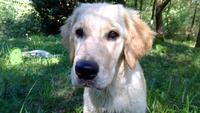
Country/State : UK
Age : 19
Joined : 2020-10-14
Posts : 5584
 |  Subject: Re: Mathison Museum of Natural History Subject: Re: Mathison Museum of Natural History  Sun Jul 11, 2021 2:36 pm Sun Jul 11, 2021 2:36 pm | |
| A lovely realistic kangaroo from this wonderful brand!  |
|
  | |
widukind

Country/State : Germany
Age : 48
Joined : 2010-12-30
Posts : 45745
 |  Subject: Re: Mathison Museum of Natural History Subject: Re: Mathison Museum of Natural History  Sun Jul 11, 2021 6:04 pm Sun Jul 11, 2021 6:04 pm | |
| - Bonnie wrote:
- A lovely realistic kangaroo from this wonderful brand!
 I agree |
|
  | |
rogerpgvg

Country/State : UK
Age : 54
Joined : 2016-04-29
Posts : 3894
 |  Subject: Re: Mathison Museum of Natural History Subject: Re: Mathison Museum of Natural History  Sun Jul 11, 2021 8:35 pm Sun Jul 11, 2021 8:35 pm | |
| |
|
  | |
Sponsored content
 |  Subject: Re: Mathison Museum of Natural History Subject: Re: Mathison Museum of Natural History  | |
| |
|
  | |
| | Mathison Museum of Natural History |  |
|
